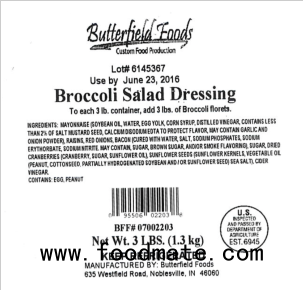Screen Shot 2016-06-03 at 9.02.58 PMThe broccoli salad kit items were produced on various dates between Nov. 10, 2015 and May 25, 2016. The following product is subject to recall:

The product subject to recall bears establishment number EST. 6945 inside the USDA mark of inspection. The product has sell-by dates from December 10, 2015 through June 23, 2016. These items were shipped to retail locations in Indiana and Ohio and used to make prepared salad products further distributed to consumers at grocery delicatessens.
The problem was discovered on June 2, 2016, when the establishment was notified by its distributor that the SunOpta sunflower kernel products used in the Butterfield Foods’ Broccoli Salad Kit dressing product were involved in a recall due to possible contamination with Listeria monocytogenes. There have been no confirmed reports of adverse reactions due to consumption of the Butterfield Foods product being recalled.
Consumption of food contaminated with Listeria monocytogenes can cause listeriosis, a serious infection that primarily affects older adults, persons with weakened immune systems, and pregnant women and their newborns. Less commonly, persons outside these risk groups are affected.
Listeriosis can cause fever, muscle aches, headache, stiff neck, confusion, loss of balance and convulsions sometimes preceded by diarrhea or other gastrointestinal symptoms. An invasive infection spreads beyond the gastrointestinal tract. In pregnant women, the infection can cause miscarriages, stillbirths, premature delivery or life-threatening infection of the newborn. In addition, serious and sometimes fatal infections can occur in older adults and persons with weakened immune systems. Listeriosis is treated with antibiotics. Persons in the higher-risk categories who experience flu-like symptoms within two months after eating contaminated food should seek medical care and tell the health care provider about eating the contaminated food.
Consumers who have purchased prepared salad products that contain the recalled product from grocery delicatessens are urged not to consume them.







